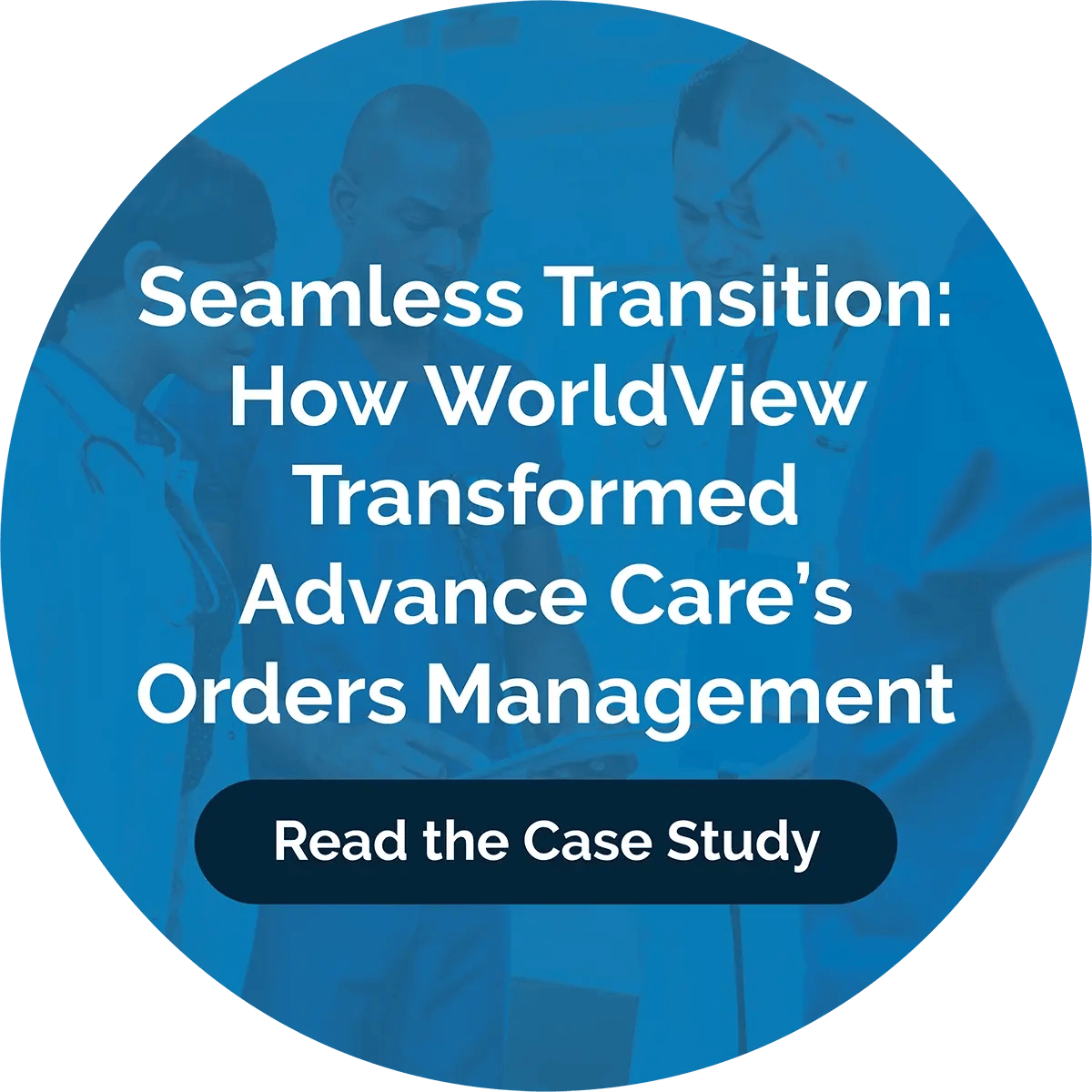Hospice Services & Rare Diseases

Hospice services and elder care franchises are critical for patients at the end of life because they improve quality of life and relieve unnecessary suffering. If you’re a hospice professional, you can also offer support to your patients’ families as they navigate end-of-life care by guiding them through their loved one’s condition.
Caring for hospice patients with rare diseases presents unique challenges, including increased hospitalization rates and a lack of resources. By documenting treatments and their outcomes, you supply valuable information for future patients with the same rare disease. Electronic health records (EHR) and documentation can help you navigate rare diseases and develop personalized care for your patients.
WorldView’s complete medical records management solution centralizes all patient records, allowing you to easily track disease progression, monitor treatment results, and provide seamless communication among EHR teams.
Understanding Rare Diseases in Hospice Care
Rare diseases are life-threatening or debilitating diseases that impact fewer than 200,000 people in the United States. Some rare diseases are more common in hospice care such as Huntington's Disease, ALS, cystic fibrosis, and muscular dystrophy.
Challenges associated with treating these patients include a lack of resources, a lack of awareness on how to manage symptoms, and a shortage of specialists.
The Role of Proper Documentation
Thorough documentation helps you and other caregivers manage the same disease more effectively. EHR lets you closely monitor symptoms and note how treatments are working. You can note your successes and failures and inspire other medical professionals to develop new treatments. By registering patients who share their treatment data, you help other medical professionals understand and improve treatment protocols.
People with rare diseases often have a higher cost per patient per year (PPPY), partially because you may be trying treatments to manage symptoms without knowing whether or not they will work. Proper documentation keeps you from repeating the unsuccessful ones.
In a hospice setting, you need to monitor vitals, track wound care, record medication doses, and more to learn about the disease and manage its progression. You also need thorough records for legal compliance.
If your patient is seeing multiple specialists, you need to consolidate paperwork, such as patient referrals and treatment notes, to speed up the process.
Key Strategies for Effective Documentation
You can improve healthcare documentation efforts for patients with rare diseases with standard documentation practices. Encourage your team to take detailed visit notes using consistent terminology to identify new symptoms, patterns, and disease progression. If your patient starts showing new symptoms, consult the Rare Disease Report and other journals to learn what it means and how to treat it.
Use EHRs so all patient notes and documents are in one location and easily accessible by every member of the care team. With EHRs, you can transmit documents to your patients’ specialists for individualized care.
How WorldView Supports Hospice Care
WorldView offers a hospice solution that gives you what you need to manage patients with rare diseases. Easily compile and track physician orders and referrals to speed up intake and coordinate your care team. Time is essential when managing a rare disease. Instantly submit referrals to get your patients into treatment sooner.
Many patients with rare diseases participate in research studies and clinical trials, which involve more physician orders and patient documentation.
WorldView helps you compile and track all patient documentation and transfer it securely to seamlessly hand off care when you need to. With automation and our cloud-based solution, every member of your team can access notes, wound-imaging, and other documents faster. So, they are always making treatment plans with the latest information.
Darlene Coles, a medical records specialist, appreciates how much time she saves with WorldView. “The biggest impact WorldView has had on us is giving us back our time. Everything is in one place, and I can see everything with a lot fewer clicks. I have been able to do a lot more around the office.”
Impact on Patient Care and Outcomes
Accurate and updated records are a must when caring for patients with rare diseases. Because your team may not be familiar with symptoms and treatment options, they rely on EHRs to monitor symptoms and track disease progression.
Instead of wasting time on ineffective treatments, your team can consult literature and better manage their patients’ comfort.
Extensive documentation also helps future patients. When you add a patient-reported outcomes report to your standard documents, you measure critical data others can use to treat rare conditions. Researchers are making strides in treating diseases such as ALS, and use documentation to share successes with fellow care professionals.
Conclusion
Documentation helps you successfully treat hospice patients with rare diseases. Detailed and accurate patient notes, medical records, and other documentation helps you manage your patients' symptoms and keep from spending time on treatments that don’t work.
WorldView offers a document management system you can use to effectively coordinate patient care and stay on top of their documents. Schedule a demo today to see how our solution lets you seamlessly manage patient records and coordinate care.
Blog Post Tags
HospiceGet Awesome Content Delivered Straight to Your Inbox!
Posts by topic
- Healthcare
- Business
- AI
- Hospice
- AP Workflows
- Home Care Management
- hospice-care
- General
- Industry Insights
- agency
- Blog
- Commercial
- reporting
- Data Analytics
- billing
- referrals
- News
- Referral AI
- business goals
- Operations
- business development
- partners
- Integration
- Healthcare Trends
- leadership
- Medicare
- Compliance
- audit
- medicaid
- Better Charting
- Home Health Reimbursement
- Medicare Compliance
- regulations
- Application
- Automation
- CMS Updates
- finance
- CRM
- DMSi
- Events
- KanTime
- LUPA Threshold
- Press Release
- Revenue Growth
- Announcements
- Artificial Intelligence
- EHR
- ESign
- Guides
- Homecare Homebase
- Mobile
- PDGM 2026
- Physician Order Tracking
- axxess
- clinical
- document management
- home Health Operations
- hospice workflow
- interoperability
- payor
- workflow automation See All See Less


.png?width=596&name=23%20(1).png)
.png?width=596&name=1%20(18).png)
.png?width=596&name=1%20(14).png)